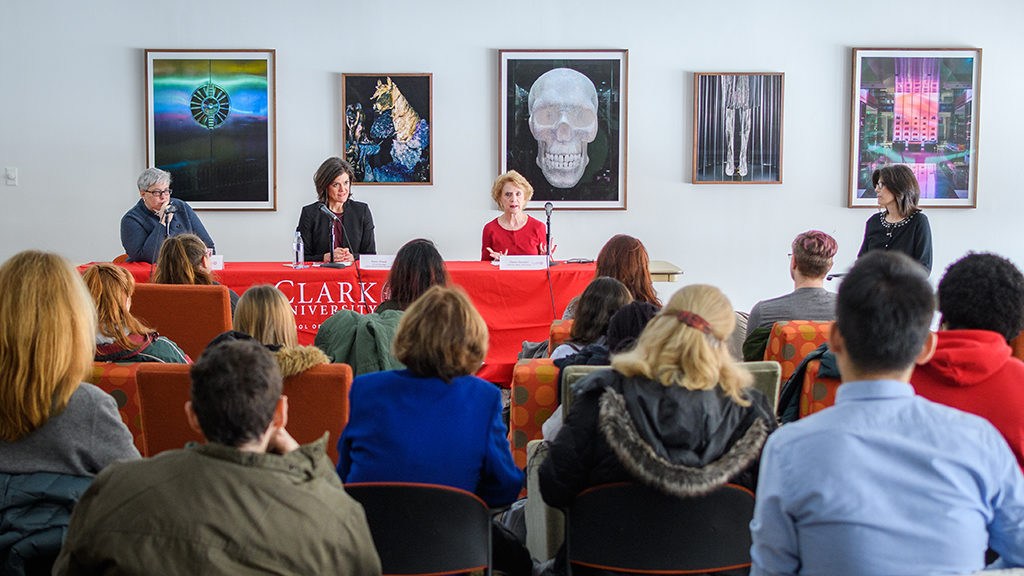HR experts offer 11 tips to ace your job interview

Does the prospect of a job interview fill you with trepidation? You’re not alone — most people find the hiring process stressful.
At a Feb. 14 panel discussion, “Impressing the HR Professional,” seasoned human resources professionals offered valuable insights that can help improve our performance and ease your anxiety.
Graduate students of all disciplines gathered in the Higgins Lounge in Dana Commons to glean advice on how to stand out in an interview, learn best practices for communicating with hiring managers, and discover what really goes on behind the closed doors of an HR department.
Participants included Jane Moyer, vice president and chief officer of human resources at Northeastern University; Diane T. L. Santoro, chief human resource officer at Public Consulting Group; and Kara M. Greer, vice president and manager of talent strategy and planning at Liberty Mutual Commercial Insurance.
The panelists shared the following tips on how to land your dream job:
- Determine if the organization’s culture is right for you. According to Greer, a good fit is all about values. “Write down the top five things that are important to you and seek a role that aligns with those values,” she recommended.
- Connect with your network. Do a search on LinkedIn to find people in your prospective organization who can give you the inside scoop, Santoro said. “Most people love to talk about what they love about their jobs, the ‘stick’ factor, and what the pitfalls are in an organization.”
- Consider your first impression. Take your time crafting application materials and think about how you want to brand yourself, the panelists advised. In an interview, present yourself the way you’d like to be perceived. “We are looking for somebody who is reliable and conscientious,” Moyer said. “The hiring committee may forget about some of the things you’ve said once you leave, but they will have an impression of you. So think about what you want that impression to be.”
- Answer questions clearly. Every question asked presents an opportunity for you to explain why you’re the best person for the position — but answer concisely. “Think about what your stories are,” Greer said. “Your ability to be succinct and generous and get across who you are is a great skill, and it’s a positive flag in your interview.”
- Tell your life story well. Identify the competencies you’ve gained from the breadth of your experiences, even if that means enlisting help to do so. “Find that person in your life who knows you well and can translate the experiences in your life that you may be taking for granted,” Santoro said. “They’ll be able to help you take into account those internships, summer jobs, and volunteer work, and recognize the skills you developed as a result.”
- Take notes. If your nerves get the better of you, put pen to paper. “My best tip for you is to write down the keywords of questions interviewers are asking,” Moyer recommended. “A red flag is somebody who rambles, so this practice helps keep you on track to make sure you answer the question in a focused way.”
- Do your research. Take sincere interest in the organization, be informed, and ask thoughtful questions. “I had someone ask me the other day: How does this job fit into your vision for the HR organization?” Moyer said. “It was an excellent question. Bring something to me.”
- Use your recruiter. “Your recruiter is your safe place,” Santoro said. “They act as your advocate, your ally, and your trust partner throughout the process.” Ask them questions about the organization’s culture, mission, and how your potential role fits into the organizational values.
- Focus on the job for which you’re applying. Don’t focus on how the organization can facilitate your success later in your career. “Coming in fully energized about the specific role is so important,” Greer explained. “Trust that your career will progress later on. If you’re talented, the other jobs will come.”
- Vocalize your needs. In salary negotiations, be realistic about the value of your job, while also ensuring your needs are met. “Never say no immediately,” Santoro advised. “Use words like ‘expectations’ or ‘outside of what I was hoping for’ if you’re disappointed with your offer. This is an automatic trigger for the employer to engage and explore options.”
- Show gratitude. Thank your recruiter and the hiring committee after the interview process is complete. “Don’t forget what your grandmother taught you,” Moyer said. “A thank-you goes a long way, and it’s meaningful.”
Greer encouraged those going through the daunting interview process to persevere. “Getting a job is an endurance sport — it takes resiliency, time, energy, and determination,” she said. “Don’t stop. The right role will come. Continue to learn from every interview you go on.”
The event was hosted by Clark University’s Graduate School of Management, International Development, Community, and Environment department, and the School of Professional Studies. Kelly Kochis, associate director of career services in the Graduate School of Management, moderated the panel. The panel was sponsored by Yuko Aoyama, associate provost and dean of research and graduate studies.


